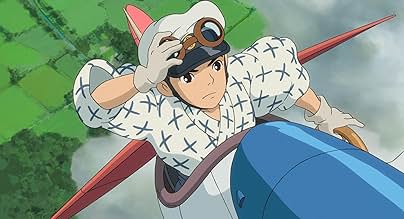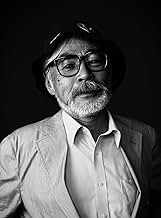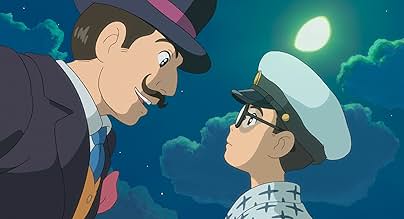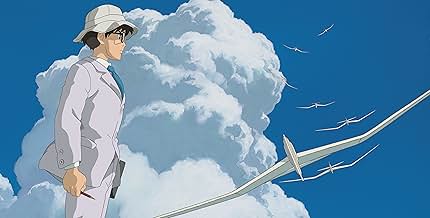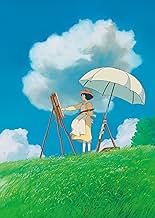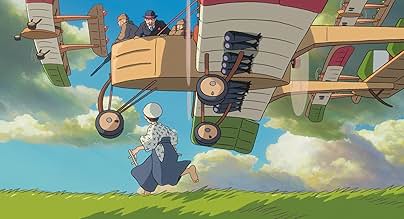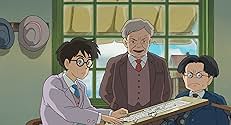Uno sguardo alla vita di Jiro Horikoshi, l'uomo che ha progettato i caccia giapponesi durante la seconda guerra mondiale.Uno sguardo alla vita di Jiro Horikoshi, l'uomo che ha progettato i caccia giapponesi durante la seconda guerra mondiale.Uno sguardo alla vita di Jiro Horikoshi, l'uomo che ha progettato i caccia giapponesi durante la seconda guerra mondiale.
- Candidato a 1 Oscar
- 26 vittorie e 54 candidature totali
Hidetoshi Nishijima
- Honjô
- (voce)
Jun Kunimura
- Hattori
- (voce)
Stephen Alpert
- Castorp
- (voce)
- (as Steve Alpert)
Morio Kazama
- Satomi
- (voce)
Joseph Gordon-Levitt
- Jirô Horikoshi
- (English version)
- (voce)
John Krasinski
- Honjô
- (English version)
- (voce)
Emily Blunt
- Nahoko Satomi
- (English version)
- (voce)
Martin Short
- Kurokawa
- (English version)
- (voce)
Stanley Tucci
- Caproni
- (English version)
- (voce)
Mandy Patinkin
- Hattori
- (English version)
- (voce)
Mae Whitman
- Kayo Horikoshi
- (English version)
- (voce)
- …
Recensioni in evidenza
The Wind Rises is a fictionalized biography / character study of Jiro Hirikoshi and his story of becoming an Aviation Engineer. This movie had a great impact on me after seeing it in the theatre and I thought about what I had seen for the one hour drive home afterwards. In terms of pacing and how the movie focuses on the main character I was reminded of David Lean movies in its maturity and emotional grit. There were also times when watching that I thought to myself I have never seen hand drawn animation this good ever and will probably never see animation this good ever again. The character designs are beautiful. The backgrounds and color pallete are beautiful. The animation is breathtaking. But the story is just as beautiful as the artwork. The movie is about one mans journey to make beautiful airplanes but is also equally tragic in later scenes of the movie in the evolving love story and especially the last scene in the movie.
This movie does not explain at any time through dialogue what the character is feeling but instead it shows you and the subtle and at times powerful emotions which are the glue of what holds his story together. Some people may wonder why Miyazaki took creative risks with the real life story of Jiro Hirikoshi. The real life Jiro never married to a woman with Tuberculosis. Did he really fantasize about building airplanes? Was he really followed by a Soviet Spy? I think the way the character fantasizes about airplanes even when not dreaming is an honest depiction of how creative people like Hayao Miyazaki think.
Along with Porco Rosso this is probably Hayao Miyazaki's most personal movie. If you study Hayao Miyazaki's movies and read about his career like I have it becomes obvious that this movie is as much about Jiro Hirikoshi as it is about Hayao Miyazaki.
I recommend anyone who has ever been creative to go see the Wind Rises.
Hayao Miyazaki's Most Beautiful film.
This movie does not explain at any time through dialogue what the character is feeling but instead it shows you and the subtle and at times powerful emotions which are the glue of what holds his story together. Some people may wonder why Miyazaki took creative risks with the real life story of Jiro Hirikoshi. The real life Jiro never married to a woman with Tuberculosis. Did he really fantasize about building airplanes? Was he really followed by a Soviet Spy? I think the way the character fantasizes about airplanes even when not dreaming is an honest depiction of how creative people like Hayao Miyazaki think.
Along with Porco Rosso this is probably Hayao Miyazaki's most personal movie. If you study Hayao Miyazaki's movies and read about his career like I have it becomes obvious that this movie is as much about Jiro Hirikoshi as it is about Hayao Miyazaki.
I recommend anyone who has ever been creative to go see the Wind Rises.
Hayao Miyazaki's Most Beautiful film.
I don't know if I loved it right from minute one, but then it doesn't quite start like any Miyazaki film (well, even with a dream scene). Its a little quieter, more natural, thoughtful and subdued, much like the main character will be through the film. And then earthquake hits. Its unlike anything you've seen in an animated film. It doesn't hype up its suspense or action. it simply shows Its protagonist, Jiro, react to a situation as calm and controlled as possible amid the debris and darkness and chaos, and help a couple of people in need. of course he doesn't know this young woman he saves will be an emotional foundation for his life. But as with any simple but splendid poetry we have a sense of the connection made.
Any other director might just make it a film about the 1920s earthquake that devastated Tokyo. Not Miyazaki. Soon after Tokyo is up and running and Jiro is after his passion which is airplanes. He dreams about them, and more than that dreams about the Italian icon of flying he looks up to as he gives Jiro advice and philosophical points about flying, inspiration and technology. And very soon after the film is more than anything about this man and his process - finding without any grandiose strokes what can make a plane fly quicker, faster, safer, with more agility and s look like no other. And, sometime soon, finding a love all his own.
Miyazaki has said (once again but probably for real this time) that he is done making films with the conclusion of the Wind Rises. If so, that's fine. I'm not sure if it's any sort of culmination of what his career has been or what he's said - Though you could certainly have a double feature with Porco Rosso, also about the wonder of flight but more in an adventure fantasy approach and have a fantastic several hours - and yet it's no less a marvel than anything else he's made. And if anything it just reveals more depths to how he feels for people and can show them in dimensions on screen than ever before. It is a biopic still, and a line here or there may be cornball, but so what. Its a fiercely intelligent film with genuine sentiment and a grace that comes from being a master letting your story unfold without rushing, letting scenes play out for full emotional weight, And ample colors and compositions painted with nostalgia for a mood (if not necessarily a side in history).
And yet you may think going in that there will be some sort of agenda politically speaking as it looks at a man who helped, ultimately, design planes that dropped bombs and shot and killed the US during world war two. It really isn't, or as simple as that. A couple of scenes with a German businessman of a sort voiced by Werner Herzog (yes the one and only, you'll know him when you hear him) lays out the futility in war and conflicts. And Jiro agrees. when someone speaks to him about what planes will be sent to fight whom, he is already resigned. "Japan will burn,' he says more or less. And yet he always stays more pragmatic, more about the work and the hard enough task to make the planes and make them fly high and well. This double edged sword also comes out when he is talking to his Italian guru in his dreams (especially the last one at the end of the war).
With all of this, the Wind Rises is a touching love story that seems possibly very doomed from the start - before getting engaged Jiro is told by Nahoko she has Tuberculosis and he doesn't care, or at least about that deterring him away - and how strong their bond is. How often do we get to see people in a movie, animated or otherwise, act like this to one another with kindness and compassion and a tenderness that (for the most part, maybe there's a bit of that "Japanese Disney" schmaltz but not much) is without any reservation? Not often really, at least like this as told at times without words at all; the high point of the picture is when there is a kind of wordless courtship as Jiro flies a paper plane around and it goes to the girl and she flies it back out as he chase to catch it and it repeats. The moving music, the amiable tone of the whole set piece, the mild peril... I'm at a loss to how much that just works because it feels true.
Did I mention its among the ten most beautifully animated films ever made? And I'm sure that group includes Mononoke and Totoro already. And I know full well a term like 'beautiful" is overused and tired. But Miyazaki crafts his works (or did) by hand with gorgeous, clear lines, water colors and maybe some cgi, and it both serves the story and its own sense of the world it's in: the earthy greens, the shiny clouds and blue skies, the metallic force of the planes, the drab grays of the offices and plane hangers. And yet you are still wrapped up in the tale of this man and those who cared about him or were inspired by and led by him, and is another rarity (easier to pull off in literature, trickier here and Miyzaki just about pulls it off): a mild wind that grows with power and energy, briefly, and then ebbs and flows with reality and, again, thought.
Any other director might just make it a film about the 1920s earthquake that devastated Tokyo. Not Miyazaki. Soon after Tokyo is up and running and Jiro is after his passion which is airplanes. He dreams about them, and more than that dreams about the Italian icon of flying he looks up to as he gives Jiro advice and philosophical points about flying, inspiration and technology. And very soon after the film is more than anything about this man and his process - finding without any grandiose strokes what can make a plane fly quicker, faster, safer, with more agility and s look like no other. And, sometime soon, finding a love all his own.
Miyazaki has said (once again but probably for real this time) that he is done making films with the conclusion of the Wind Rises. If so, that's fine. I'm not sure if it's any sort of culmination of what his career has been or what he's said - Though you could certainly have a double feature with Porco Rosso, also about the wonder of flight but more in an adventure fantasy approach and have a fantastic several hours - and yet it's no less a marvel than anything else he's made. And if anything it just reveals more depths to how he feels for people and can show them in dimensions on screen than ever before. It is a biopic still, and a line here or there may be cornball, but so what. Its a fiercely intelligent film with genuine sentiment and a grace that comes from being a master letting your story unfold without rushing, letting scenes play out for full emotional weight, And ample colors and compositions painted with nostalgia for a mood (if not necessarily a side in history).
And yet you may think going in that there will be some sort of agenda politically speaking as it looks at a man who helped, ultimately, design planes that dropped bombs and shot and killed the US during world war two. It really isn't, or as simple as that. A couple of scenes with a German businessman of a sort voiced by Werner Herzog (yes the one and only, you'll know him when you hear him) lays out the futility in war and conflicts. And Jiro agrees. when someone speaks to him about what planes will be sent to fight whom, he is already resigned. "Japan will burn,' he says more or less. And yet he always stays more pragmatic, more about the work and the hard enough task to make the planes and make them fly high and well. This double edged sword also comes out when he is talking to his Italian guru in his dreams (especially the last one at the end of the war).
With all of this, the Wind Rises is a touching love story that seems possibly very doomed from the start - before getting engaged Jiro is told by Nahoko she has Tuberculosis and he doesn't care, or at least about that deterring him away - and how strong their bond is. How often do we get to see people in a movie, animated or otherwise, act like this to one another with kindness and compassion and a tenderness that (for the most part, maybe there's a bit of that "Japanese Disney" schmaltz but not much) is without any reservation? Not often really, at least like this as told at times without words at all; the high point of the picture is when there is a kind of wordless courtship as Jiro flies a paper plane around and it goes to the girl and she flies it back out as he chase to catch it and it repeats. The moving music, the amiable tone of the whole set piece, the mild peril... I'm at a loss to how much that just works because it feels true.
Did I mention its among the ten most beautifully animated films ever made? And I'm sure that group includes Mononoke and Totoro already. And I know full well a term like 'beautiful" is overused and tired. But Miyazaki crafts his works (or did) by hand with gorgeous, clear lines, water colors and maybe some cgi, and it both serves the story and its own sense of the world it's in: the earthy greens, the shiny clouds and blue skies, the metallic force of the planes, the drab grays of the offices and plane hangers. And yet you are still wrapped up in the tale of this man and those who cared about him or were inspired by and led by him, and is another rarity (easier to pull off in literature, trickier here and Miyzaki just about pulls it off): a mild wind that grows with power and energy, briefly, and then ebbs and flows with reality and, again, thought.
This is a breathtaking masterpiece of art that allows your mind and heart to soar like the wind .The story is loosely based on the real life story of Jiro Horikoshi (Joseph Gordon- Levitt). He dreams of flying but, because he's nearsighted, decides to be a Japanese airplane designer. We observe his life from child to adulthood as he makes his dream plane and, in the process, falls in love with Naoko (Emily Blunt). Will Jiro create the beautiful plane or realize that the beauty he's seeking is right in front of him all along?
The film is a work of art. Hayao Miyazaki (Director and Writer) creates unique color palettes and designs. Since the movie takes place in the sky, the animators go above and beyond to hand draw backgrounds and movements for the planes. We witness them majestically soaring through the skies and you feel as if you're with them. The voice acting is well done. I think they portrayed the characters and their relationships exceptionally well. Much of the film focuses on the romance between Naoko and Jiro. Their connection is both loving and tragic. The film was first released in Japan, so American voice-overs are dubbed over the animation and yes, it can be distracting. They confront actual events that happened in Japan, such as the Kanto earth-quake of 1923 and Japan entering the war. I love the truth in this film. It doesn't shy away from talking about the real issues that happened during this time.
My favorite character is Mr.Caproni (Stanley Tucci) a historical Italian aircraft designer who is Jiro's mentor in his dreams. I enjoy Stanley's voice acting skills. He's one of those character actors who is fantastic at everything he does. The character himself is fascinating. He looks at aircraft not as a bringer of war, but a creator of dreams.
My favorite scene is the last dream sequence, after Jiro goes through a life changing experience. This is one of those bitter sweet endings, where you don't know what to think at first. You just need to take it all in.
The message in this film is, "Sometimes the outcome to your dream is not always what you expect." Jiro spends his whole life wanting to make his aircraft, determined to do anything to fulfill his goal. After a few sacrifices, he realizes his potential but it's not what he expects. Mr. Caproni then asks him, "Did you have a good ten years?"
I give this 5 out of 5 stars and recommend it to 11 to 18-year-olds. This film shows people smoking and deals with serious issues of the time. This is a must see film!
Reviewed by Keefer B, KIDS FIRST Film Critic. For more youth reviews go to kidsfirst.org.
The film is a work of art. Hayao Miyazaki (Director and Writer) creates unique color palettes and designs. Since the movie takes place in the sky, the animators go above and beyond to hand draw backgrounds and movements for the planes. We witness them majestically soaring through the skies and you feel as if you're with them. The voice acting is well done. I think they portrayed the characters and their relationships exceptionally well. Much of the film focuses on the romance between Naoko and Jiro. Their connection is both loving and tragic. The film was first released in Japan, so American voice-overs are dubbed over the animation and yes, it can be distracting. They confront actual events that happened in Japan, such as the Kanto earth-quake of 1923 and Japan entering the war. I love the truth in this film. It doesn't shy away from talking about the real issues that happened during this time.
My favorite character is Mr.Caproni (Stanley Tucci) a historical Italian aircraft designer who is Jiro's mentor in his dreams. I enjoy Stanley's voice acting skills. He's one of those character actors who is fantastic at everything he does. The character himself is fascinating. He looks at aircraft not as a bringer of war, but a creator of dreams.
My favorite scene is the last dream sequence, after Jiro goes through a life changing experience. This is one of those bitter sweet endings, where you don't know what to think at first. You just need to take it all in.
The message in this film is, "Sometimes the outcome to your dream is not always what you expect." Jiro spends his whole life wanting to make his aircraft, determined to do anything to fulfill his goal. After a few sacrifices, he realizes his potential but it's not what he expects. Mr. Caproni then asks him, "Did you have a good ten years?"
I give this 5 out of 5 stars and recommend it to 11 to 18-year-olds. This film shows people smoking and deals with serious issues of the time. This is a must see film!
Reviewed by Keefer B, KIDS FIRST Film Critic. For more youth reviews go to kidsfirst.org.
This film is totally different from Miyazaki's other films and I personally think, like what he's mentioned, a message to to world about how he looks at the war, war machines , peace, love and living. As I am a Taiwanese, who has once colonized and ruled by Japanese during the second world war, how Japanese coped with the war topic is always sensitive. However, what I saw in this film is truly reflecting that Miyazaki is peace loving and his point of view on war, life and love. He depicted about the beauty of dreams and surviving. You can see that everyone in this film try every hard to live, even though the time is hard and forced to strike a balance between dreams and reality. However, they are self fulfilling. So who is to blame? who ruined their lives and dreams? Those who leads them to the war to blame.
In short, the film perfectly shows how the director's been telling in almost every his masterpiece but in a personally way, to the audience. Just like a final message he would like yo transmit to the world. I felt overwhelmed by the film and sad that he decided to retired. Please go to watch this film and you will do feel the courage to live hard and live well.
In short, the film perfectly shows how the director's been telling in almost every his masterpiece but in a personally way, to the audience. Just like a final message he would like yo transmit to the world. I felt overwhelmed by the film and sad that he decided to retired. Please go to watch this film and you will do feel the courage to live hard and live well.
Miyazaki's swan song, most likely. It's an animated biopic of Jiro Horikoshi, a Japanese aircraft engineer who developed the Zero, the plane which would eventually bomb Pearl Harbor and do kamikaze attacks in WWII. The man himself was a pacifist (at least according to this film). Most of the film just deals with the man's love for flight, which obviously makes the story very dear to Miyazaki. In fact, a good portion of the film takes place in Horikoshi's dreams, where he can invent any crazy contraption. First and foremost, the film is gorgeous. Though it mostly deals with the real world, it finds the beauty in it. As good as the film is, it isn't one of Miyazaki's best. It's a little long-winded and slow (definitely don't take your kids to it, even if they're big Ghibli fans). Miyazaki kind of neuters the militaristic history of Japan at that time. You can feel some terrible stuff going on in the background, but, outside of the Germans, whom our hero visits at one point, all the characters whom we meet are perfectly nice people. I would have liked a more detailed picture of history at the time. Also, the romance that is depicted in the film, which is entirely invented, is a tad too maudlin (though it is quite nice up front). And, though I won't hold it against the film itself, the English language dub is awful. This may be due to the film's specific, Japanese setting, but I really felt the voice actors were just dull as Hell. I hate to say it, but Joseph Gordon-Levitt in the lead role is the worst. The least offensive performances come from Martin Short and Mae Whitman (the latter is a professional voice actress who is great on Avatar: The Last Airbender, though she is best known for her role as Michael Cera's dull girlfriend Ann on Arrested Development). I wish I had just seen the subtitled version instead (it was playing here, but at an inconvenient theater). I might like the film better seeing it subtitled. All those criticisms don't amount to too much, though. It's a wonderful film.
Lo sapevi?
- QuizHuman voices are largely used as sound effects, such as engine roars and earthquake sounds.
- BlooperAfter Jiro tells Nahoko that he's finished designing his plane, he falls asleep. Nahoko removes his glasses and places them on the floor behind their heads. In the next shot, from behind their heads, there are no glasses on the floor.
- Curiosità sui crediti[A quote in French from a poem by Paul Valéry that appears as a caption at the start of the movie.] The wind is rising! We must try to live!
- ConnessioniEdited into Miyazaki Dreams of Flying (2017)
- Colonne sonoreHikouki-gumo
(Contrails)
Written by Yumi Matsutôya (as Arai Yumi)
Performed by Yumi Matsutôya (as Arai Yumi)
Courtesy of Toshiba EMI (Universal Music Japan)
I più visti
Accedi per valutare e creare un elenco di titoli salvati per ottenere consigli personalizzati
Dettagli
- Data di uscita
- Paese di origine
- Siti ufficiali
- Lingue
- Celebre anche come
- Se levanta el viento
- Aziende produttrici
- Vedi altri crediti dell’azienda su IMDbPro
Botteghino
- Budget
- 30.000.000 USD (previsto)
- Lordo Stati Uniti e Canada
- 5.209.580 USD
- Fine settimana di apertura Stati Uniti e Canada
- 313.751 USD
- 23 feb 2014
- Lordo in tutto il mondo
- 137.091.048 USD
- Tempo di esecuzione
- 2h 6min(126 min)
- Colore
Contribuisci a questa pagina
Suggerisci una modifica o aggiungi i contenuti mancanti







